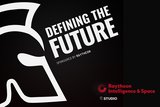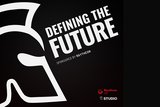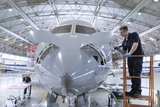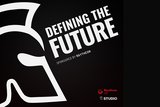Defining the Future Podcast Bonus Episode - the Multi-INT Approach
How is the multi-intelligent approach bringing new capabilities to the modern battlefield?
The world of work is changing, with COVID-19 and emerging technologies accelerating existing trends in defence and wider afield. Raytheon UK believes the training sector must adapt to this new reality – and seize the opportunities it presents.
Organisations today must pursue a robust upskilling strategy, something that was apparent even before the disruption of Coronavirus-induced lockdowns. Raytheon UK points to 2017 research from McKinsey, which found that 14% of the global workforce – or 375 million workers – will have to switch occupations or acquire new skills by 2030, thanks to the impact of automation and artificial intelligence (AI).
What’s more, 87% of executives said they were experiencing skills gaps in the workforce or expected them within a few years, but less than half had a clear sense of how to address the problem.
Raytheon UK has observed these trends close up, with training a growing focus for the defence and security specialist for more than a decade.
For example, the company has trained thousands of Royal Air Force (RAF), Royal Navy and British Army personnel to operate the Airborne Stand-Off Radar system of the RAF’s Sentinel aircraft, while it has also designed and supported Command and Staff Training (CAST) and enhanced Higher Formation Training for the British Army and NATO at three facilities.
The deep experience of the wider Raytheon Technologies in the US military and around the globe, combined with its work in the commercial world – for example, through its training work with the automotive sector and cyber apprenticeships – gives Raytheon UK a unique insight into the changing priorities and demands within the sector.
In today’s world, these changes are taking place against the backdrop of COVID-19, which has disrupted some priorities and accelerated others, according to Frazer Ross, Head of Government & Military Training Solutions at Raytheon UK.
He says the virus has opened a Pandora’s Box, particularly when it comes to investment decisions.
‘It is absolutely a paradigm shift that we need to take on board in terms of the way we spend, the way we design and the way we conduct our training,’ Ross explains.
This is most notable when it comes to crew training, with the demands of social distancing upending traditional teaching methods.
For militaries, this could be a three-person crew in a tank, or the crew of a nuclear submarine, or even a battlegroup; whatever the group in question, companies and organisations must work out what they can gain through technologies like augmented reality (AR) and virtual reality (VR), the levels of competence that can be achieved, and the efficiencies and effectiveness benefits that could be realised through conducting large portions of training remotely.
‘There is risk baked in against the traditional paradigm that we've had until now, and we really need to think about that very carefully as a defence industry,’ Ross warns.
Even before the onslaught of the pandemic, the UK and other countries were faced with skills gaps in a range of areas, says Rachel Kay, learning director at Capita.
She sees this in three major categories: skills around business performance, such as the ability of leadership to manage change; technology skills, such as programming; and data science, with organisations in defence and beyond faced with a growing mass of information.
Beyond these three “buckets” – and underpinning wider skills shortages – is a need to boost problem solving skills and creative thinking, Kay adds.
‘Even though you've got those quite technical skills around data science and technology, you still need teams to be able to take information and problem solve,’ she says, noting that this is often a weakness in university graduates and those who have come through an apprenticeship scheme.
However, while COVID-19 is likely to accelerate a trend towards technologies like VR and AR, and less emphasis on collective training, there is a limit to this process, says Martin Faussett, CEO of Elbit UK.
This will depend on the nature of the training, he says – for example, while training personnel for a ship’s operations room could take place in a synthetic environment to a significant extent, this is arguably less true for infantry training.
‘There is, unfortunately, a training value in being cold, wet and tired – and you can't replicate that inside,’ Faussett says.
Ross agrees, arguing that while VR headsets and other technologies have demonstrated impressive capability, organisations must be clear on the learning outcome such systems are supporting.
The key is to ensure that the technology is apposite to the learning outcomes required, whether individual or collective training. He sees particular potential in the applications of gamification to training, though he notes that industry and the military must work to truly understand ‘what those benefits of gamification can be’.
Companies must consider not just the types of skills they need and the technologies that can help them along the way, but the people they are training.
While a great deal of investment has rightly focused on training the young adults of “Generation Z” – typically viewed as the cohort born from the mid-1990s to the early 2010s – it is now time to consider the future: the “Generation Alpha” children born in the last decade, who will enter the world of work in the 2030s.
We must begin working to understand the potential skills gaps of these future employees, Ross says, ‘so that we're designing the systems, we're designing our training, our learning, around, frankly, something that we don't really understand yet’.
The workers of Generation Z – and the future employees from Generation Alpha – are likely to adapt and thrive under the emerging technologies of the training domain, says Julian Free, deputy vice chancellor for people services and operations at the University of Lincoln.
‘Some of them are much [happier] sticking their hand up on chat [functions] and using chat for a question in a digital space than they are in a lecture sticking their hand up,’ he says. It is vital that organisations recognise the potential downsides of this cultural shift, but look to exploit the benefits, too, he adds.
Ross points to the growing overlap and cross-pollination between the commercial and defence sectors.
For example, while the military ‘has always been very good about putting people in pigeonholes and putting them down particular streams, selecting them for those streams very early on’, the commercial world is far more flexible, allowing employees to essentially transfer themselves from one area to another through developing their skillsets. Militaries must be ‘far more agile with that’, he argues.
The UK is looking to the future, asking how it can fast-forward the economy beyond the COVID-19 crisis and other challenges of recent years.
This ambition will demand world-class training solutions and the defence industry can help support this transition, both directly with government and through its partnerships with the commercial sector.
Ross highlights the importance of apprenticeships, noting that he was part of the team that introduced Modern Degree Apprenticeships to the British Army during his military career.
This is also a key priority for Raytheon UK, he says, particularly in the digital and cybersecurity domains. It is a key tenet of how the company – and business as a whole – can help support the UK government’s skills agenda and the post-COVID recovery.
‘Not just at a national level, not just at a corporate level, but also at a regional level with regional stakeholders to really improve those digital and cyber literacy skills… that’s why Raytheon is really investing so much in it.’
To learn more about Raytheon UK's training capabilities, listen to episode 1 of the Defining the Future podcast.

How is the multi-intelligent approach bringing new capabilities to the modern battlefield?

The combination of sensors is key to forming a comprehensive picture of the modern battlefield.

A thriving space sector will have long-term positives for the UK economy, fuelled by new initiatives by government and industry.

What's the role of the UK space sector in the global Britain envisioned for the future?

Future-proofing our training is the best way of ensuring our Armed Forces are equipped to keep us safe and secure in the future says Frazer …

Welcome to Shephard Studio’s Defining the Future podcast, sponsored by our partner Raytheon UK. Listen on Apple Podcasts, Google Podcasts, Spotify and more. The way we work is changing …